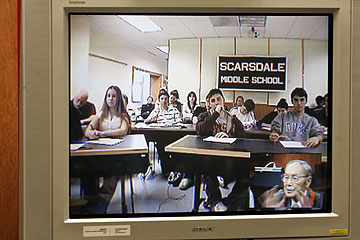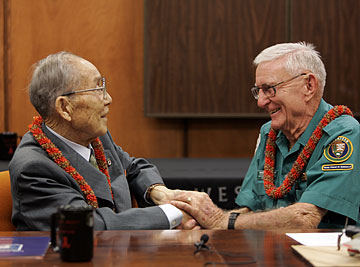WORLD WAR II VETS SHARE STORIES

DENNIS ODA / DODA@STARBULLETIN.COM
Zenji Abe and Everett Hyland told stories yesterday about the attack on Pearl Harbor during a video conference at the East-West Center with ninth-graders at Scarsdale High School in Scarsdale, N.Y. In courtesy photos, Abe, below left, poses on the flight deck of the aircraft carrier Akagi a week before the attack on Pearl Harbor. Hyland, below right, is shown in his dress whites at the age of 17.
|
|
Connection of generations
An American seaman and a Japanese pilot discuss the war with students in New York
WITH AN EASE of high-tech communication that might have changed history had it been available in 1941, two veterans of the attack on Pearl Harbor were grilled long distance yesterday by students in Scarsdale, N.Y.
The kickoff "Witness to History" program, sponsored by the Arizona Memorial Museum Association, used video-conferencing abilities at the East-West Center so that students thousands of miles away could talk to Everett Hyland, a seaman injured aboard the USS Pennsylvania, and to Zenji Abe, a dive-bomber pilot whose memoir, "The Emperor's Sea Eagle," has just been released in English.
Hyland and Abe were flanked by East-West Center educator Namji Steinemann, translator Paul Cobbett and moderator Dan Martinez of the National Park Service, who noted, "These two warriors meet in a time of peace to remember a time of war."
Abe credited American interest in Japanese military history for helping tear down a national veil over the war years: "In Japan the details of the war are not taught. ... We can now bring it to education."
Abe was earnest, while retired elementary school principal Hyland often put the kids at ease.
"Being a teenager in the Navy, of course I was a genius," said Hyland. "My position was deep inside the ship. If anything happens, you want to be topside, so you can get off that tub!"
"Those who want to be historians out there, this is what we go through," said Martinez with a laugh. "It's not easy!"
Hyland's tale turned grim when he described the wounds that placed him in a hospital death ward for nine months: "Our uniform of the day was shorts and T-shirts without dog tags. That's why there are so many 'unknowns' buried in Punchbowl."
Asked if the Japanese were fed anti-American propaganda prior to the attack, Abe explained that "Japan was very poor. ... Millions of Japanese were displaced to Manchuria and Hawaii and Brazil just so those in the island could put food on the table. We had to industrialize for national survival. What we called the ABCD -- American, Britain, China, Dutch -- colonial powers wanted to stop our industrialization. ABCD was characterized as Japan's oppressor, and the leader of ABCD was America."
What was the chief cause of the attack? asked another student. "That's for the politicians -- I was just a sailor," said Hyland. "It's the politicians who start these things."
Was there any mental preparation for the attack?

DENNIS ODA / DODA@STARBULLETIN.COM
The inaugural "Witness to History" program used video-conferencing technology at the East-West Center yesterday, enabling students in Scarsdale, N.Y., to listen to pilot Zenji Abe talk about his experiences. The program was sponsored by the Arizona Memorial Museum Association.
|
|
"As a warrior there are certain things one must do. It is the code of Bushido, down to wearing clean underwear," said Abe. "You prepare to die. As warriors we had no special animosity toward Americans. We are trained samurai, ordered by our superiors into battle for the empire. No feeling of trepidation. Japan had been training for this battle for 10 years."
Asked why he became a volunteer at the Arizona Memorial, Hyland said he had returned to Hawaii for the 50th anniversary in 1991 and fallen for an attractive Japanese tour guide -- "It's the sailor in me." They wound up getting married in an Oahu Buddhist temple: "I put my toothbrush in my pocket and wound up here."
Abe was asked about why he felt obligated to write a book. He paused before continuing.

DENNIS ODA / DODA@STARBULLETIN.COM
Following the video conference, Zenji Abe and Everett Hyland shook hands.
|
|
"In order to become wise citizens, we must study history," Abe said. "Even (Prime Minister) Koizumi doesn't know the facts in my book. Pearl Harbor is THE event of the 20th century. It changed the world. In one blow the effect was the shattering of colonialization. If Pearl Harbor had not taken place, there might not be so many independent countries.
"Nonetheless, it was a mistake for Japan. We did not study history well enough. It was a huge error to attack the U.S. ... (but) I have no apology for my role in it," said Abe, emphasizing that he was a professional warrior, a sword wielded by his government in a lawful manner.
"My great regret is that it is characterized as a 'sneak attack.' It is most vexatious and bitter, the failure of our diplomats in America to give declaration of war in a timely manner. Deceiving the U.S. is a very bitter thing to overcome. In the way of the warrior, in the Bushido code, we do not shoot someone in the back. If a samurai warrior comes across a sleeping enemy, we kick the pillow and say, 'Get up. Prepare for battle.'"
BOOK SIGNING
Zenji Abe will sign copies of "The Emperor's Sea Eagle" from 8:30 to 11 a.m. today and tomorrow at the Arizona Memorial Visitor Center.
Call: 422-5664, ext. 1
|

